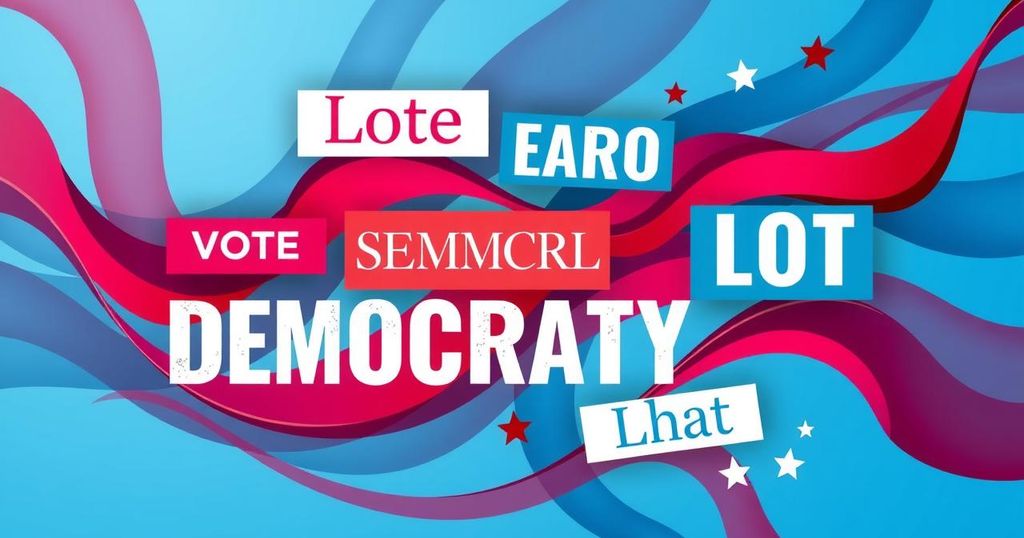The Secret to Crafting Effective Political Slogans
- Political campaigns thrive on catchy slogans that engage voters.
- Chris Bruni-Lowe has analyzed 20,000 campaign messages to find effective slogans.
- The eight winning words are people, better, democracy, new, time, strong, change, and together.
- However, strong candidates must also possess charisma and appealing policies.
- Bespoke slogans may excel in very specific contexts but might not appeal widely.
The Building Blocks of Effective Political Slogans
Some might wonder whether there exists a secret recipe for crafting impactful political slogans that can clinch elections. Every successful political campaign thrives on a compelling slogan—something catchy that can mobilize voters and put opponents on the defensive. While certain slogans, like Barack Obama’s “Yes, We Can” and the Brexit mantra “Take Back Control,” resonate well beyond Election Day, others have for sure met with lackluster reception, leading to eyes being rolled or sighs of disbelief. Political strategist and pollster Chris Bruni-Lowe thinks he has solved this puzzle, stating in his new book, “Eight Words That Changed The World,” that he has identified words which truly resonate with voters universally, and he’s analyzed over 20,000 campaign messages to do so. The eight words he highlights are people, better, democracy, new, time, strong, change, and together.
The Power of Language and Emotional Shortcuts
Bruni-Lowe emphasizes that these words are not a magic bullet for guaranteed success. If the candidate presenting them is charisma-challenged or has deeply unpopular policies, then these magic words won’t help. Additionally, he cautions against stringing these words together haphazardly. For instance, variations like “Strong New Time” or “People Better Change” simply won’t deliver the desired effect. He describes these as ’emotional shortcuts’—building blocks that slogan-writers can use successfully across various cultures and languages. Voters inherently understand what promises lurk behind keywords like “people,” “better,” or “together” without a need for lengthy policy discussions. All types of political actors—from socialists in South Africa to conservatives in Luxembourg—can adapt these words to suit their narratives. Bruni-Lowe insists that the most frequently utilized winning campaign word is “people,” referencing Bill Clinton’s memorable 1992 slogans like “Putting People First.” In contrast to George H.W. Bush, Clinton was able to play up his persona as a “people person.”
The Historical Context of Slogans
However, is it possible that relying on this framework could lead to bland slogans? Notably effective phrases, such as Boris Johnson’s 2019 campaign slogan of “Get Brexit Done,” were crafted with narrow focuses. Yet, Bruni-Lowe argues these bespoke slogans are the exceptions to his guidelines and often emerge when a singular unresolved grievance overshadows other issues, providing a tantalizing, easy fix. Bruni-Lowe’s contributions include phrases like “Change Politics For Good” for Nigel Farage’s Brexit Party and “It’s Time” for Jakov Milatovic. His exploration extends even to Donald Trump’s “Make America Great Again” (MAGA), which he notes doesn’t follow his framework. Trump claims he came up with this phrase in 2012, yet, according to Bruni-Lowe, variations of “great again” have been around for over a century.
The Current Landscape of Political Messaging
For instance, the UK Conservative Party attempted to use the slogan back in 1950 during a failed election run. Ronald Reagan found success with his own iteration in 1980. Regardless of the origins of MAGA, Trump managed to turn it into a powerful brand that divided American politics, even going the extra mile to register it with the Trademark Office, effectively preventing others from using it. In the UK, the Brexit campaign slogan is possibly the most well-remembered in recent years, indicative of a trend towards concise, impactful messaging. Discussing the Labor Party’s recent messaging, Bruni-Lowe highlights a campaign that distilled its message down to the single powerful word “Change,” while the Conservatives tried—and possibly failed—with a longer phrasing in “Clear Plan, Bold Action, Secure Future.”
Future Directions in Political Campaigning
However, this might be the last we see of traditional slogans. Increasingly, artificial intelligence is being harnessed to develop messages that resonate with the specific concerns of individual voters, often delivered through social media. This rapid evolution does not stop there; it is correlated with rising interest in neuroscience, enabling insights into how people neurologically respond to political triggers like campaign materials. These developments might significantly alter the interaction between elected officials and their constituents. Nevertheless, they might also mean the end of some of those catchier campaign slogans we have grown to love. Take, for example, one of the earliest political ads on U.S. television dating back to 1952, which featured the catchy jingle “I Like Ike” aimed at promoting Dwight D. Eisenhower. This simple yet effective tune successfully humanized the former Supreme Commander, and when it came time for his re-election, they merely tweaked it to “I Still Like Ike,” clearly proving effective without fitting Bruni-Lowe’s model.
In conclusion, the art of crafting the perfect political slogan is not as straightforward as it sounds. Chris Bruni-Lowe’s research offers compelling insights into key components that resonate with voters but suggests these elements are just part of a bigger equation. The evolution of technology and changing political landscapes may soon reshape our understanding of how effective campaigns are constructed, edging us towards a potentially slogan-less future.




Post Comment